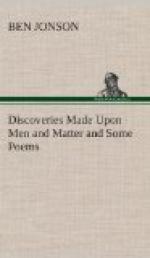Mores aulici.—I have discovered that a feigned familiarity in great ones is a note of certain usurpation on the less. For great and popular men feign themselves to be servants to others to make those slaves to them. So the fisher provides bait for the trout, roach, dace, &c., that they may be food to him.
Impiorum querela.—Augusties.—Varus.—Tiberius.—The complaint of Caligula was most wicked of the condition of his times, when he said they were not famous for any public calamity, as the reign of Augustus was, by the defeat of Varus and the legions; and that of Tiberius, by the falling of the theatre at Fidenae; whilst his oblivion was eminent through the prosperity of his affairs. As that other voice of his was worthier a headsman than a head when he wished the people of Rome had but one neck. But he found when he fell they had many hands. A tyrant, how great and mighty soever he may seem to cowards and sluggards, is but one creature, one animal.
Nobilium ingenia.—I have marked among the nobility some are so addicted to the service of the prince and commonwealth, as they look not for spoil; such are to be honoured and loved. There are others which no obligation will fasten on; and they are of two sorts. The first are such as love their own ease; or, out of vice, of nature, or self-direction, avoid business and care. Yet these the prince may use with safety. The other remove themselves upon craft and design, as the architects say, with a premeditated thought, to their own rather than their prince’s profit. Such let the prince take heed of, and not doubt to reckon in the list of his open enemies.
Principum. varia.—Firmissima vero omnium basis jus haereditarium Principis.—There is a great variation between him that is raised to the sovereignty by the favour of his peers and him that comes to it by the suffrage of the people. The first holds with more difficulty, because he hath to do with many that think themselves his equals, and raised him for their own greatness and oppression of the rest. The latter hath no upbraiders, but was raised by them that sought to be defended from oppression: whose end is both easier and the honester to satisfy. Beside, while he hath the people to friend, who are a multitude, he hath the less fear of the nobility, who are but few. Nor let the common proverb (of he that builds on the people builds on the dirt) discredit my opinion: for that hath only place where an ambitious and private person, for some popular end, trusts in them against the public justice and magistrate. There they will leave him. But when a prince governs them, so as they have still need of his administrations (for that is his art), he shall ever make and hold them faithful.




